Abstract
The influence of methylprednisolone on the passage of ampicillin and gentamicin into and activity within cerebrospinal fluid was examined in two models of experimental meningitis. Steroid pretreatment reduced the concentrations of these drugs in purulent cerebrospinal fluid of rabbits with experimental pneumococcal and Escherichia coli meningitis (P less than 0.05). However, the resultant mean concentrations of these antibiotics in cerebrospinal fluid still exceeded the minimal bactericidal concentrations of the infecting organisms. The rate of bactericidal effect in vivo was unaffected by steroid therapy in each model. Methylprednisolone did not have deleterious effects on the course of treated experimental meningitis under these short-term (24-h) experiments.
Full text
PDF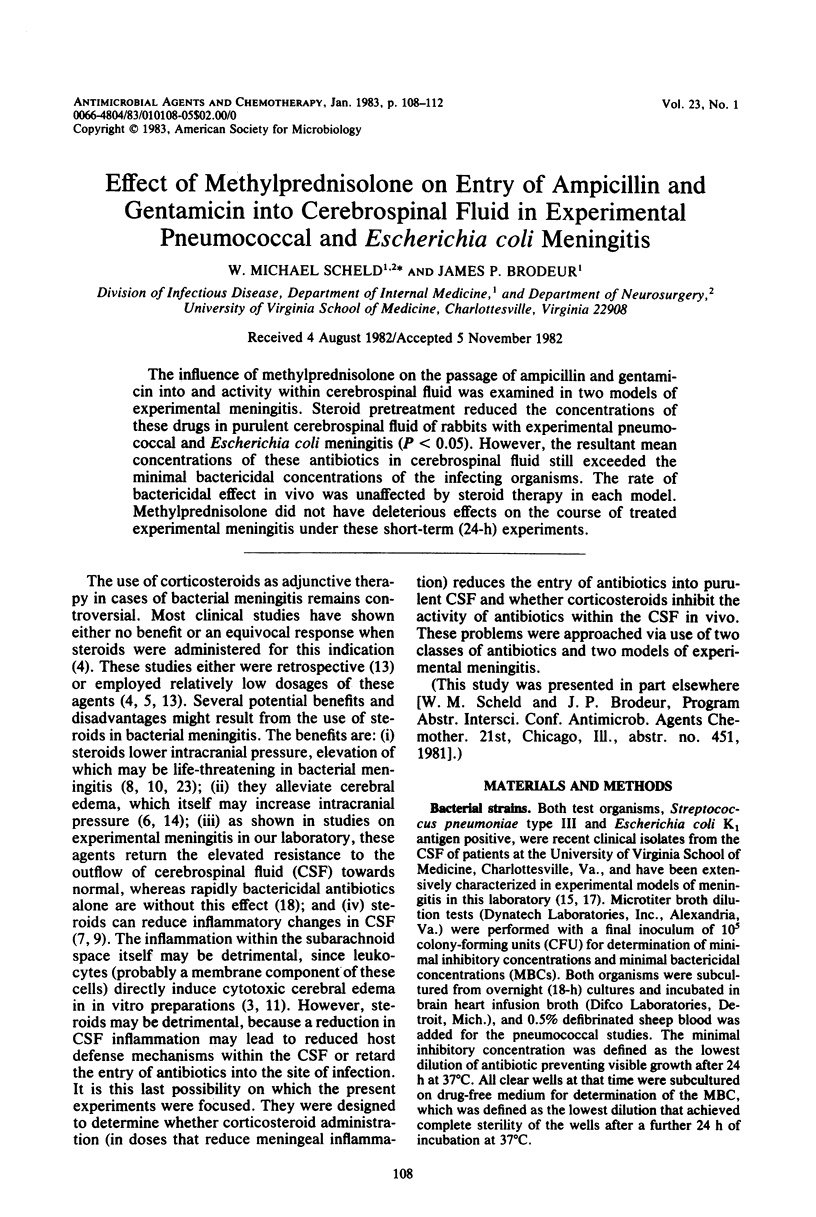
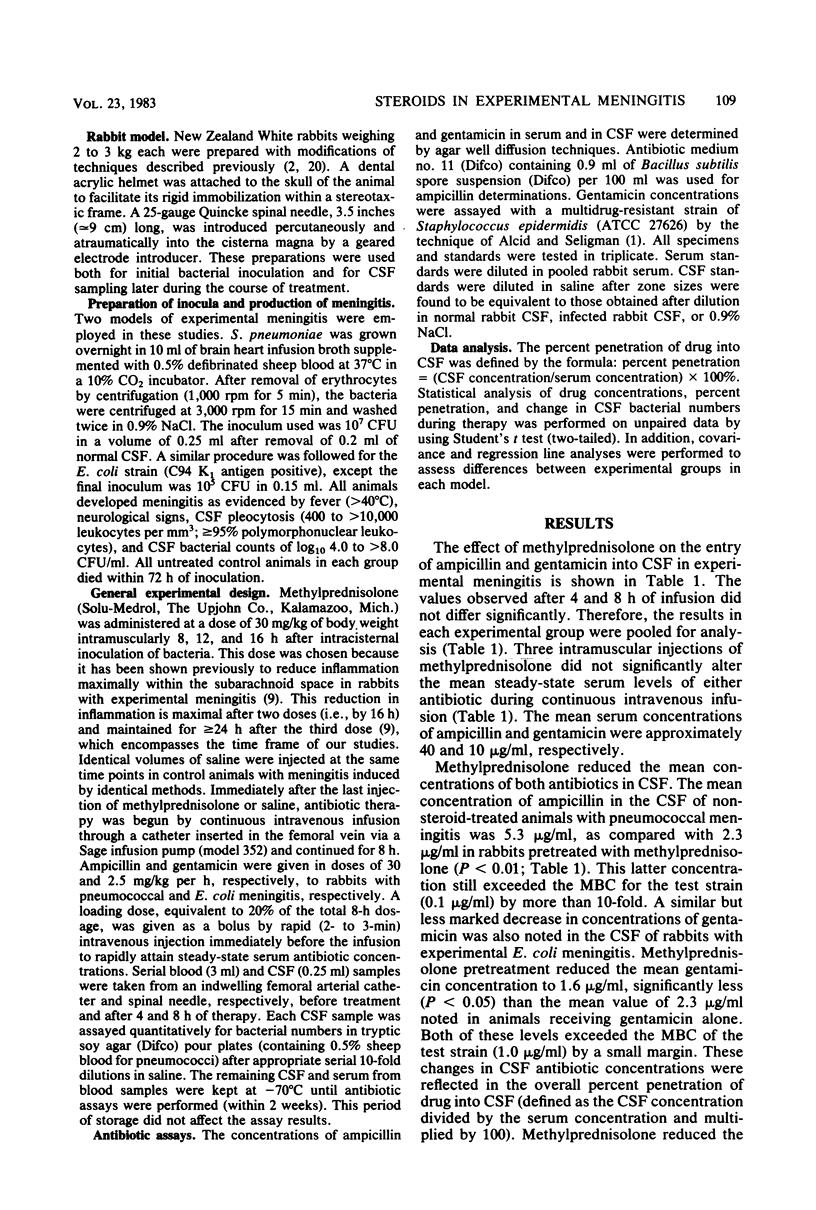
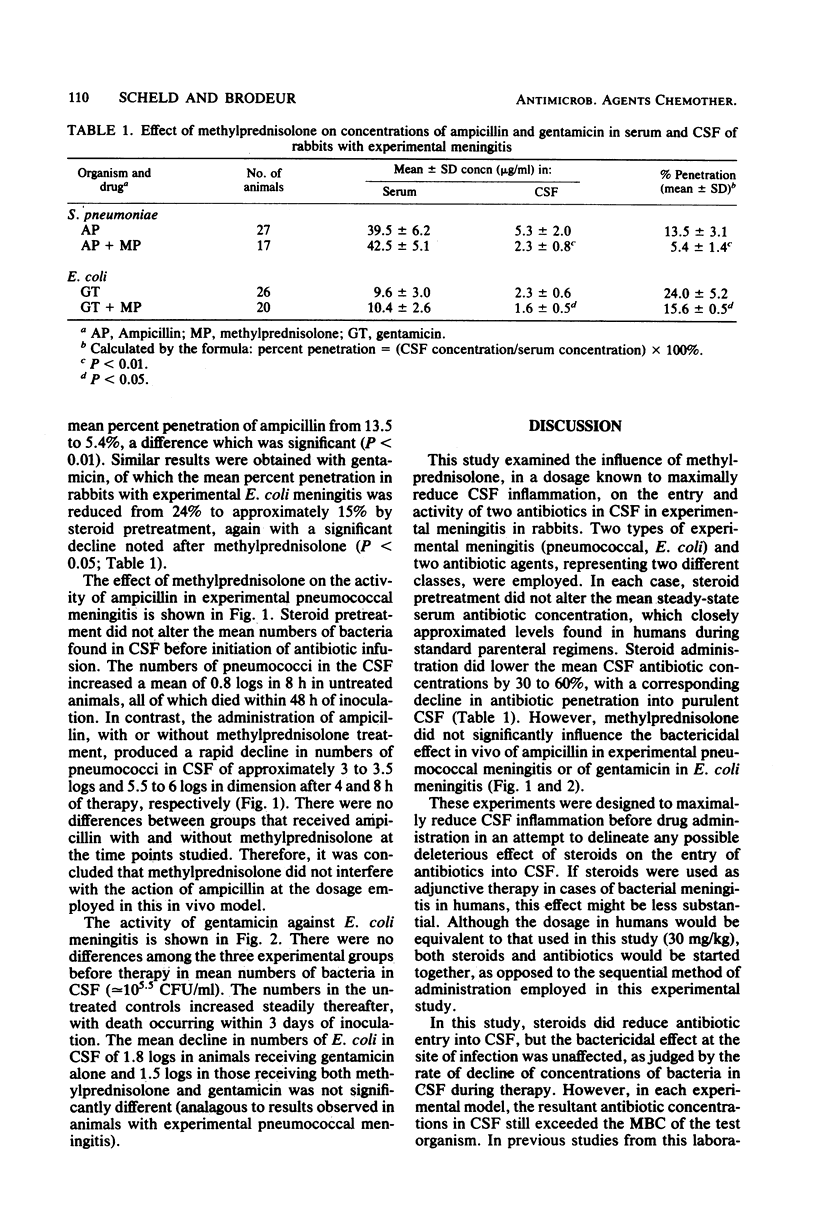
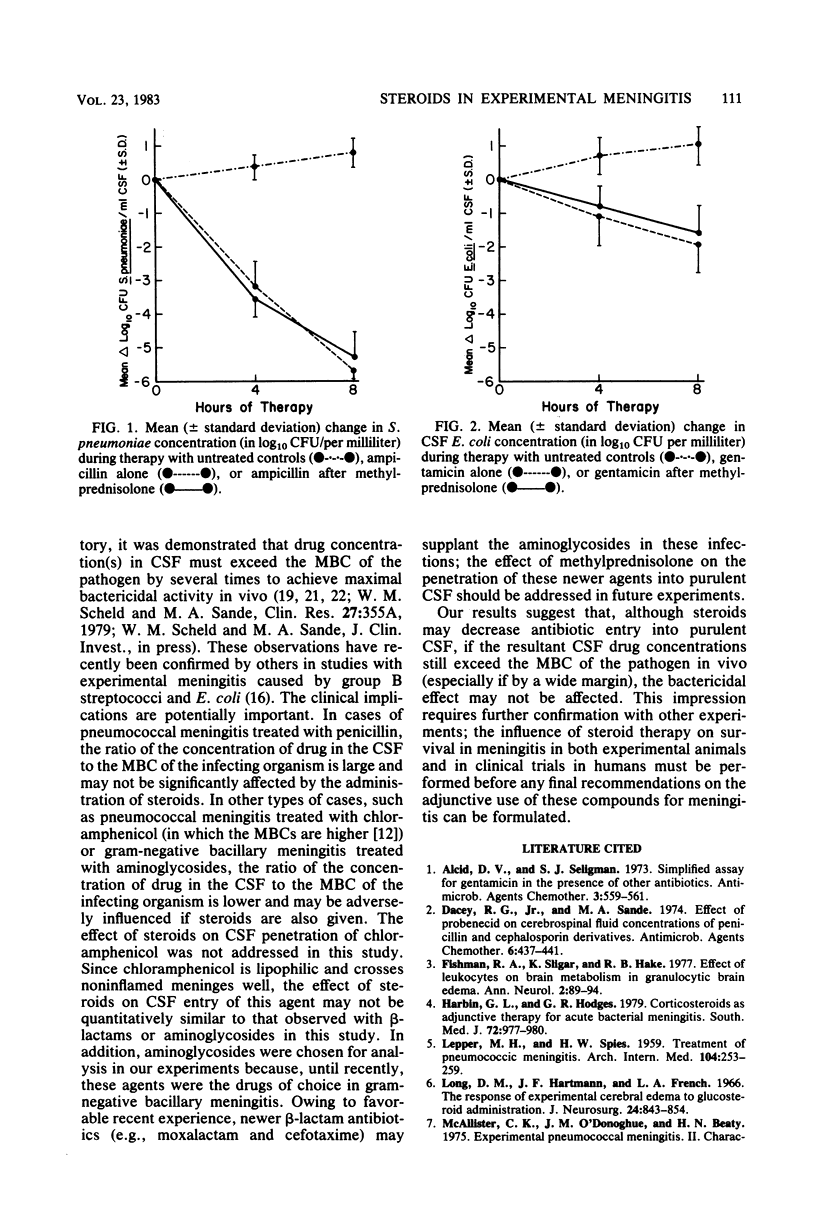
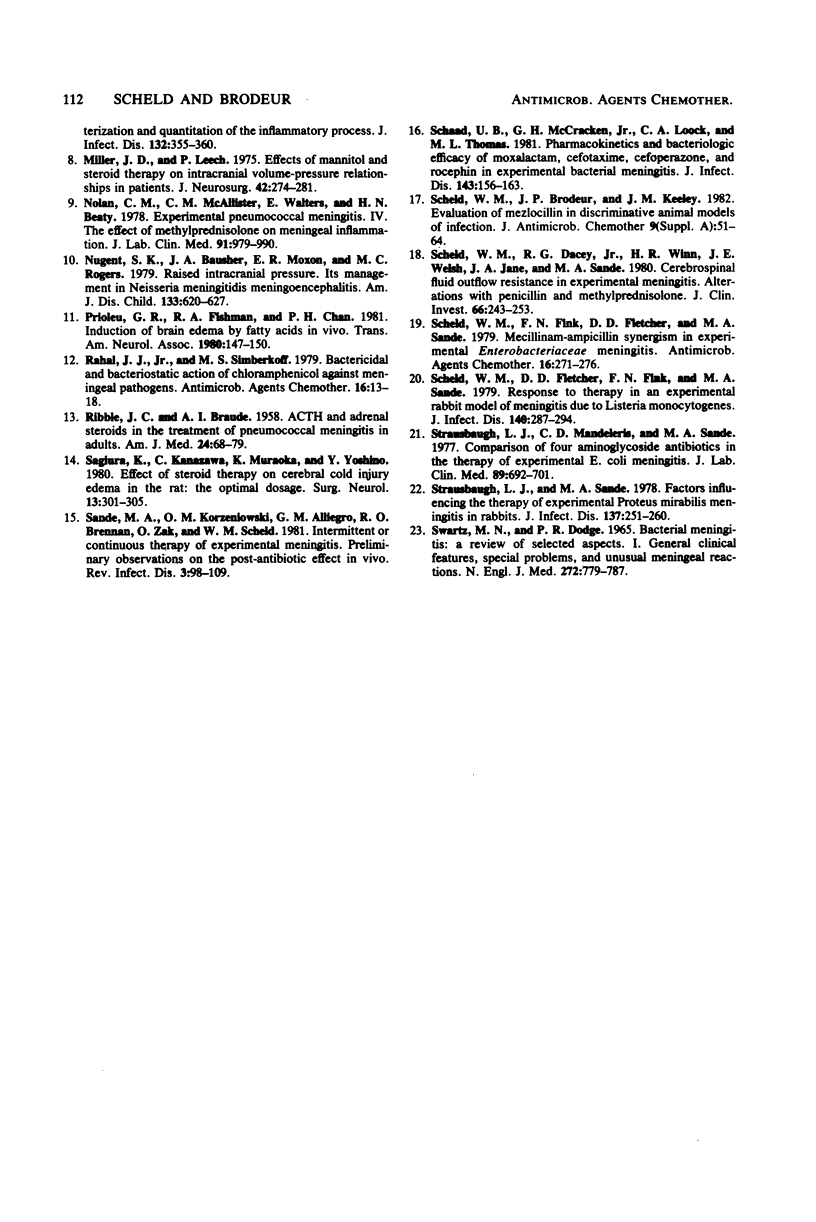
Selected References
These references are in PubMed. This may not be the complete list of references from this article.
- Alcid D. V., Seligman S. J. Simplified assay for gentamicin in the presence of other antibiotics. Antimicrob Agents Chemother. 1973 May;3(5):559–561. doi: 10.1128/aac.3.5.559. [DOI] [PMC free article] [PubMed] [Google Scholar]
- Dacey R. G., Sande M. A. Effect of probenecid on cerebrospinal fluid concentrations of penicillin and cephalosporin derivatives. Antimicrob Agents Chemother. 1974 Oct;6(4):437–441. doi: 10.1128/aac.6.4.437. [DOI] [PMC free article] [PubMed] [Google Scholar]
- Harbin G. L., Hodges G. R. Corticosteroids as adjunctive therapy for acute bacterial meningitis. South Med J. 1979 Aug;72(8):977–980. doi: 10.1097/00007611-197908000-00024. [DOI] [PubMed] [Google Scholar]
- LEPPER M. H., SPIES H. W. Treatment of pneumococcic meningitis; results when penicillin was used alone compared with those when penicillin and streptomycin were used together, with and without hydrocortisone: alternate patient studies. AMA Arch Intern Med. 1959 Aug;104(2):253–259. doi: 10.1001/archinte.1959.00270080079010. [DOI] [PubMed] [Google Scholar]
- Long D. M., Hartmann J. F., French L. A. The response of experimental cerebral edema to glucosteroid administration. J Neurosurg. 1966 May;24(5):843–854. doi: 10.3171/jns.1966.24.5.0843. [DOI] [PubMed] [Google Scholar]
- Miller J. D., Leech P. Effects of mannitol and steroid therapy on intracranial volume-pressure relationships in patients. J Neurosurg. 1975 Mar;42(3):274–281. doi: 10.3171/jns.1975.42.3.0274. [DOI] [PubMed] [Google Scholar]
- Nolan C. M., McAllister C. K., Walters E., Beaty H. N. Experimental pneumococcal meningitis. IV. The effect of methyl prednisolone on meningeal inflammation. J Lab Clin Med. 1978 Jun;91(6):979–988. [PubMed] [Google Scholar]
- RIBBLE J. C., BRAUDE A. I. ACTH and adrenal steroids in the treatment of pneumococcal meningitis in adults. Am J Med. 1958 Jan;24(1):68–79. doi: 10.1016/0002-9343(58)90363-2. [DOI] [PubMed] [Google Scholar]
- Rahal J. J., Jr, Simberkoff M. S. Bactericidal and bacteriostatic action of chloramphenicol against memingeal pathogens. Antimicrob Agents Chemother. 1979 Jul;16(1):13–18. doi: 10.1128/aac.16.1.13. [DOI] [PMC free article] [PubMed] [Google Scholar]
- SWARTZ M. N., DODGE P. R. BACTERIAL MENINGITIS--A REVIEW OF SELECTED ASPECTS. 1. GENERAL CLINICAL FEATURES, SPECIAL PROBLEMS AND UNUSUAL MENINGEAL REACTIONS MIMICKING BACTERIAL MENINGITIS. N Engl J Med. 1965 Apr 15;272:779–CONTD. doi: 10.1056/NEJM196504152721506. [DOI] [PubMed] [Google Scholar]
- Sande M. A., Korzeniowski O. M., Allegro G. M., Brennan R. O., Zak O., Scheld W. M. Intermittent or continuous therapy of experimental meningitis due to Streptococcus pneumoniae in rabbits: preliminary observations on the postantibiotic effect in vivo. Rev Infect Dis. 1981 Jan-Feb;3(1):98–109. doi: 10.1093/clinids/3.1.98. [DOI] [PubMed] [Google Scholar]
- Schaad U. B., McCracken G. H., Jr, Loock C. A., Thomas M. L. Pharmacokinetics and bacteriologic efficacy of moxalactam, cefotaxime, cefoperazone, and rocephin in experimental bacterial meningitis. J Infect Dis. 1981 Feb;143(2):156–163. doi: 10.1093/infdis/143.2.156. [DOI] [PubMed] [Google Scholar]
- Scheld W. M., Brodeur J. P., Keeley J. M. Evaluation of mezlocillin in discriminative animal models of infection. J Antimicrob Chemother. 1982 Jan;9 (Suppl A):51–64. doi: 10.1093/jac/9.suppl_a.51. [DOI] [PubMed] [Google Scholar]
- Scheld W. M., Dacey R. G., Winn H. R., Welsh J. E., Jane J. A., Sande M. A. Cerebrospinal fluid outflow resistance in rabbits with experimental meningitis. Alterations with penicillin and methylprednisolone. J Clin Invest. 1980 Aug;66(2):243–253. doi: 10.1172/JCI109850. [DOI] [PMC free article] [PubMed] [Google Scholar]
- Scheld W. M., Fink F. N., Fletcher D. D., Sande M. A. Mecillinam-ampicillin synergism in experimental Enterobacteriaceae meningitis. Antimicrob Agents Chemother. 1979 Sep;16(3):271–276. doi: 10.1128/aac.16.3.271. [DOI] [PMC free article] [PubMed] [Google Scholar]
- Scheld W. M., Fletcher D. D., Fink F. N., Sande M. A. Response to therapy in an experimental rabbit model of meningitis due to Listeria monocytogenes. J Infect Dis. 1979 Sep;140(3):287–294. doi: 10.1093/infdis/140.3.287. [DOI] [PubMed] [Google Scholar]
- Strausbaugh L. J., Mandaleris C. D., Sande M. A. Comparison of four aminoglycoside antibiotics in the therapy of experimental E. coli meningitis. J Lab Clin Med. 1977 Apr;89(4):692–701. [PubMed] [Google Scholar]
- Sugiura K., Kanazawa C., Muraoka K., Yoshino Y. Effect of steroid therapy on cerebral cold injury edema in the rat: the optimal dosage. Surg Neurol. 1980 Apr;13(4):301–305. [PubMed] [Google Scholar]


